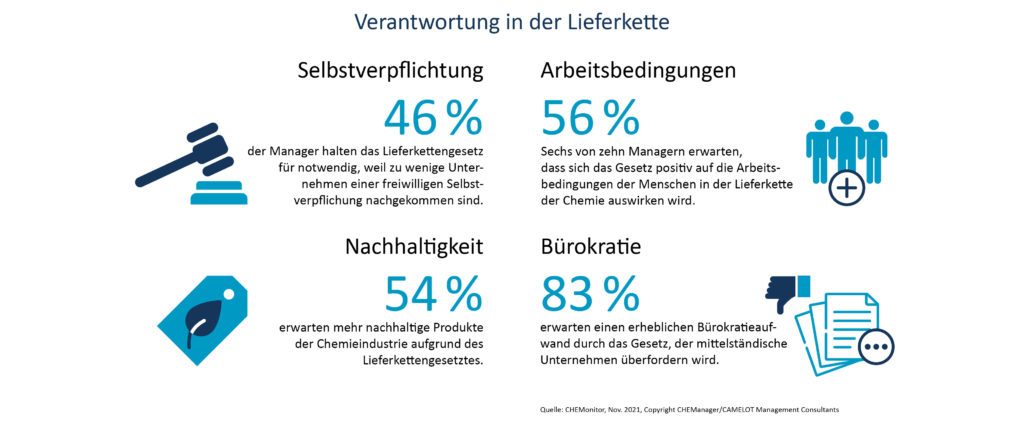CHEMonitor Study Shows Significantly Lower Satisfaction with Chemical Site Germany
Basel, Mannheim, November 10, 2021 – The recently passed German Supply Chain Act divides the chemical industry: more than half of the chemical managers surveyed expect it to have a positive impact on sustainability in the supply chain. However, a large proportion fear the associated bureaucracy, which will overburden medium-sized companies in particular in terms of personnel and finances. Only 6 out of 10 managers are still satisfied with Germany as a chemical site.
These are the results of the 37th CHEMonitor trend barometer, for which Innofact, on behalf of CAMELOT Management Consultants and the trade newspaper CHEManager, surveyed top managers in the German chemicals industry in September and October 2021. Dr. Josef Packowski, Managing Partner at CAMELOT, comments: “Satisfaction with Germany as a chemical site has declined significantly, especially with regard to logistics and the availability of raw materials. For the site factor raw material availability, the positive ratings dropped by 20 percentage points compared to the last survey, and for infrastructure and logistics by 13 percentage points. “Chemical companies that are already working intensively on improving their supply chain resilience now have a clear competitive advantage,” says Packowski.
Supply Chain Law: Challenge and Opportunity
The focus of the current CHEMonitor study is the new German “Supply Chain Due Diligence Act”, which was passed in June this year. It regulates corporate due diligence along the entire supply chain and obliges companies across all sectors to protect human rights as well as labor and environmental standards. The law will become binding for companies with 3,000 or more employees by 2023 and for companies with 1,000 or more employees by 2024.
Just under half of the CHEMonitor survey participants (46%) believe the law is necessary because too few companies have so far complied with a voluntary commitment. “Despite the voluntary commitment, only slightly more than half of the companies affected by the Supply Chain Act are largely implementing the required measures,” confirms Dr. Jörg Schmid, study director at CAMELOT. For example, only 52% of the companies surveyed currently work with a code of conduct for suppliers in their contracts and only 44% use a management system for human rights and environmental risks.
As far as the implementation of the Supply Chain Law is concerned, the survey participants see a lack of alternatives for critical suppliers as a challenge, in addition to bureaucratic costs (88%) and legal uncertainty regarding liability (58%). The expected administrative effort poses personnel and financial problems, especially for medium-sized chemical companies. “The law represents a major challenge, particularly for medium-sized companies that are indirectly affected, and this challenge can only be met with higher-level IT solutions,” explains Schmid.
Despite the many challenges, the majority of study participants see the law as an opportunity for people’s working conditions to improve along the supply chain.
The complete CHEMonitor results are available as a free download at www.camelot-mc.com (German only).






